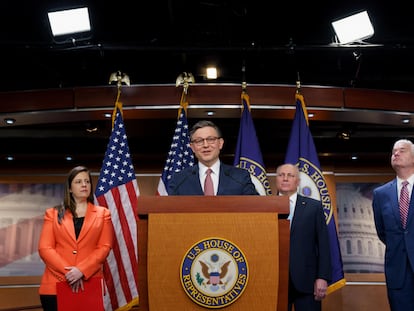US avoids government shutdown with late-night vote after agonizing session
Congress approves funding for government on a dramatic day marked by rebellion in the hard-line wing of the Republican Party


Another day of chaos, drama and marathon sessions on Capitol Hill. Technically, the U.S. Government ran out of funding for part of the Administration at midnight on Friday. However, the Senate passed the budget bills two hours after the deadline, so the Administration shutdown was only theoretical and of no consequence, since the operations of the federal government are settled daily. After the House of Representatives passed the pending budget bills in a climate of rebellion among Republican radicals, the Senate exceeded the deadline, but without any consequences.
The Senate had only 13 hours to debate and pass a bill of more than 1,000 pages worth $1.2 trillion in funding. In addition, it was effectively vetoed from passing amendments. If the Senate introduced any, the text would have to return to the House of Representatives, which on Friday adjourned for a two-week recess.
Any amendment, therefore, no matter how small, meant a prolonged shutdown of the government. Of course, senators do not like to be stripped of their ability to amend a piece of legislation. They submitted dozens of amendments, despite knowing that they would not go through. This lengthened the debate. Until very late in the evening, there was not enough of a majority to proceed to the vote, so the time expired, but an agreement was eventually reached and it was only a matter of time before the pending amendments and then the laws were actually voted on.
“It’s been a long day, a long week and a very long few months,” said Senator Chuck Schumer, Democrat of New York and the majority leader, after announcing the agreement. The White House announced in a statement before the final vote that its budget office had ceased preparations for a government shutdown because there was a high degree of confidence that Congress would imminently approve the appropriations and the president would sign the bill into law on Saturday.
The United States doesn’t have just one budget law, but a dozen, and Congress is consistently unable to pass them before the start of the fiscal year on October 1. The last time it did so on time was in 1997. The usual practice is to approve an extension of spending, called a continuing resolution, while the enabling legislation for the fiscal year is being processed. On this occasion, three extensions had been approved.
The lags between the approval of budgets and the beginning of the fiscal year began to lead to government shutdowns after Attorney General Benjamin Civiletti argued that government agencies cannot legally operate without approved funding in a series of rulings issued in 1980 and 1981. Since then, only spending for functions essential to public safety and constitutional obligations has been allowed in those situations.
Since 1976, there had been 22 interruptions in funding up to tonight, 10 of which ended with worker layoffs. The bulk have been very short, ranging from one to three days. Most of the significant shutdowns occurred during Bill Clinton’s presidency, when then-House Speaker Newt Gingrich and his conservative majority pushed for budget cuts. The longest, however, took place between 2018 and 2019, when then-President Donald Trump and congressional Democrats entered a stalemate over their demand for funding for a border wall with Mexico. It lasted 35 days, in the middle of Christmas, but it was only a partial shutdown, because Congress had approved allocations for some areas. The shortest so far, lasting only a few hours, also took place in 2018, in February, when a senator intentionally lengthened the debate.
Six spending bills had already been approved for approximately 30% of the Administration. A package of 1.2 trillion dollars was pending approval, affecting, among others, the State Department, the Pentagon and the Department of Homeland Security, which is responsible for managing illegal immigration, as well as many other areas of responsibility. If the two packages are combined, discretionary spending for the budget year will amount to some $1.66 trillion. This figure does not include programs such as Social Security and Medicare, nor the financing of the country’s growing debt.
Drama in the House
The drama had already been intense in the lower chamber in the morning. There, the vote on the pending funding bills went ahead by a comfortable majority of 286 votes in favor and 134 against. This result, however, hides the fact that in the majority Republican group there were only 101 votes in favor and 112 against.
Marjorie Taylor Greene, Donald Trump’s faithful squire, grabbed the spotlight by announcing she intended to move a vote to remove the Speaker of the House, her colleague Mike Johnson, but the interventions of other Republican parliamentarians inside and outside the chamber have been just as harsh.
The law was agreed by the Republican and Democratic leaders of Congress together with the White House. But the Republicans of the radical wing denounce that two of the internal rules of the parliamentary group have not been complied with: that the congressmen have the legal texts at least 72 hours before having to vote on them, to give them time to study them and present amendments, and that only the laws that have a majority support among the Republicans themselves are promoted and submitted to a vote. “This funding bill passed without the majority of the majority,” said Taylor Greene critically.
The Freedom Caucus warned that no House Republican should vote for the “omnibus swamp bill”. This faction groups the Republicans’ 20 or so most radical members of Congress, from which Taylor Greene herself was expelled in July for calling a fellow Republican, extremist Lauren Boebert, a “little bitch.”
After the vote, this group’s anger was clearly expressed: “101 Republicans joined Democrats to pass this $1.2 trillion boondoggle that fully funds Biden’s “open borders” policies and includes earmarks for late-term abortions and transgender organizations. Insane,” they said.
To win Republican support, Johnson touted some of the spending increases secured for some 8,000 more detention beds for immigrants awaiting their immigration proceedings or imminent removal from the country. This is a 24% increase over current levels. In addition, the Republican leader highlighted more money to hire about 2,000 new Border Patrol agents, although a more ambitious rule endowing up to an additional $20 billion to fight illegal immigration was rejected.
Republicans also pushed a provision that prohibits funding until March 2025 for the main U.N. agency that provides food, water and shelter to Gaza’s civilian population. That provision has prompted a “no” vote from congressional Democrats in both the House and Senate.
For the more radical Republicans, none of that has been enough. “Treason” and “surrender” are the words they have repeated over and over again in the House. They preferred the partial shutdown of the Administration to reaching a compromise solution between the two parties.
The spending levels agreed upon are in line with the deal reached between U.S. President Joe Biden and then House Speaker Kevin McCarthy to suspend the debt ceiling for two years. That agreement and the first extension that avoided a partial shutdown of the Administration cost McCarthy his job. His successor, Mike Johnson, has agreed to similar measures that have had even less support from the Republicans. As a result, a motion to oust him has also been filed, albeit with an uncertain outcome.
For starters, there will be no vote on removing Johnson at least until after the two-week recess that Congress has just begun. Moreover, Taylor Greene herself has not clarified when she will call for a vote and has said that this is a warning. And also, Republicans are well aware of the show of disorder and chaos they put on after McCarthy’s dismissal.
Collaterally, the internal crisis unleashed among Republicans may affect new aid to Ukraine and Israel, which has been stuck in Congress for months. Marjorie Taylor Greene has expressly warned Johnson that she will call for a vote against him if he unblocks it. However, it is also possible that the Democrats would rescue the Speaker of the House of Representatives and prevent his ouster if he agrees to promote a deal, which would further aggravate the internal crisis of the Republicans.
Sign up for our weekly newsletter to get more English-language news coverage from EL PAÍS USA Edition









































